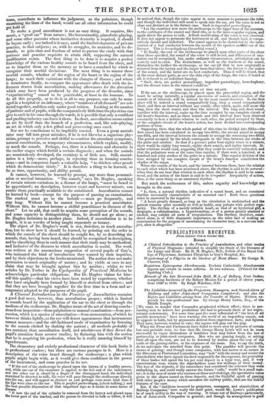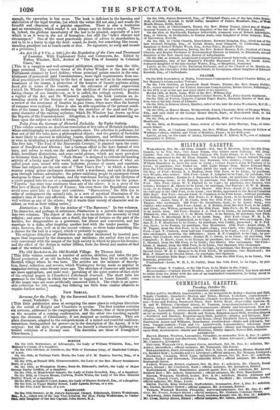PUBLICATIONS RECEIVED.
From October 17th to October 23d. BOOKS.
A Clinical Introduction to the Practice of Auscultation, and other modes of Physical Diagnosis: intended to simplify the Study of the Diseases of the Lungs and Heart. By H. M. Hughes, M.D., Fellow of the Royal Col- lege of Physicians, Assistant Physician to Guy's Hospital, &c.
Wanderings of a Pilgrim in the Shadow of Mont Blanc. By George B. Cheever, DD.
Registrum Episcopatus Aberdonensis, Ecclesie Cathedralis Aberdonensit regrets que extant in unam collects. In two volumes. (Printed for the Spalding Club.) Memoir of the late Reverend John Reid, M.A., of Bellary, East Indies; comprising Incidents of the Bellary Mission for a period of eleven years, from 1830 to 1840. By Ralph Wardlaw, D.D.
The Liabilities incurred by the Projectors, Managers, and Shareholders of Railway and other Joint-stock Companies Considered; and also the Rights and Liabilities arising from the Transfer of Shares. Written ex- pressly for non-professional use. By George Henry Lewis, Esq., of the Middle Temple. [We cease to wonder that Cassandra prophesied without effect; since in per- suading men to believe her predictions she had to persuade them of her super- natural endowments. For some time past the most influential of " the best of all possible instructors" have been warning the world of an impending smash, not by appeals to faith, but by arguments derived from experience, facts, and figures. They have, however, warned in vain; the rogues will play out the play. When the Press and Parliament have failed to move men by pictures of certain loss and probable ruin, we fear that Mr. George Henry Lewis will not be more successful by vague intimations of liabilities that may follow from the law of partnership or Joint-stock companies. Men who are gaming deeply, or setting their all upon the cast, are not to be deterred by doubts about the cost of the cards or the gaming-tables, or the expenses of the room. Nor, to say the truth, do we anticipate the mischief from this point. The gambler will provide the means of gaming; and though some companies, with bad names or no names in the Directory or Provisional Committee, may "bolt "with the money and render the shareholders who have signed the deed responsible for the expenses, the generality of those bodies will spend the ten per cent deposit in a legal way, and, if very conscientious men, return the shareholders some few shillings of their money. The loss of the deposits, if the subscribers had considered the schemes they were embarking in, and could really answer the future "calls," would be a small mat, ter ; it is the men of straw who venture on these undertakings, the speculative value given to the shares issued on these deposits, and the frightful spirit of gaming with other people's money which animates the railway public, that are the riskful features of the case.
Nor, if the "liabilities incurred by projectors„ and shareholders of Railway Companies," were really the chief point, would Mr. Lewis's publication be of much utility in the way of warning. it treats not of Railways particularly, but of Joint-stock Companies in general; and though its arrangement is good enough, the execution is but so-so. The book is deficient in the learning and elaboration of the legal treatise, (at which the writer did not aim,) and wants the breadth and clearness of a popular exposition. There is also a hesitation and an uncertainty, which render it not always easy to deduce a result. There is, indeed, the glorious uncertainty of the law to be pleaded, especially of a law WinCh is as it were in the act of formation; but still the , ta&'s obscure and circumspect." One of the most practicable pieces of advice to shareholders is, not to be in a hurry to sign the deed : sound, no doubt, but something like recom mending gamblers not to touch cards or dice. No signature, no scrip and no sale at a premium.] An.Act (8 q 9 Vic. c. 100.)for the Regulation of the Care and Treatment of Lunatics. With Explanatory Notes and Comments, &c. Edited by Forbes Winslow, MD., Author of "The Plea of Insanity in Criminal Cases," &c. [This is a complete and well-arranged publication, giving more than the title- page promised. The avowed theme of Dr. Forbes Winslow is the late Act of Parliament obtained by Lord Ashley; whose principal.... ts consist in the esta- blishment of permanent paid Commissioners, more rigi, requirements from me- dical practitioners in certifying to the fact of lunacy as well as in the subsequent treatment of the insane, a protection of the keepers of lunatic asylums acting bond fide in terms of the statute' and the extension of public supervision (which Dr. Winslow thinks amounts to the abolition of the practice) to persons taking charge of one lunatic-or, as it is called, the cottage system. Besides a reprint of the Act, and Dr. Winslow's analysis, the book contains an in- teresting sketch of the history of our legislation upon the subject; involving a review of the treatment of lunatics in past times, when more than the horrors of romance were realized. There is also an able exposition of the present condi- tion of the insane in England, embracing the statistics of the mad and the ge- neral character of the existing asylums; which Dr. Winslow has drawn up from the Reports of the Commissioners. Altogether, it is a useful and interesting vo- hune upon the subject on which it treats.] Tales from the German of Heinrich Zschokke. By Parke Godwin. [This volume contains an American translation of five tales of Heinrie.h Zschokke, whose antobiogmphy we noticed some months since. The selection is judicious; for four out of the five tales have a philosophical object; and the genius of Zschokke Is more likely to succeed in ridiculing courts, ministers, and artificial manners, or even in inculcating a mystical and 'Utopian affection, than in a common romance. The first tale, "The Fool of the Nineteenth Century," is planned upon the senti- ment of Sandford and Merton; but a German officer is the hero instead of two boys, and serves to work out the author's idea of the absurdity of decorations, duels, hereditary distinctions, and some social abuses, which are more prevalent in Germany than in England. "Jack Steam " is designed to ridicule the bustling activity of a lucky man of the world, and to expose the hollowness of what are called great men, mixed with some ludicrous pictures of courts and courtiers. These last subjects are the sole aim of "New Year's Eve"; in which a harem- marum young prince exchanges dresses with a watchman, and each in disguise goes through various adventures ; the prince satirizing people in extempore verses analogous to those of our bellman, and the watchman having all the intrigues of a court poured into his ear at a masquerade, where he is mistaken for the prince. " Floretta" has more true sentiment than any of the others: it is a story of the first love of Henry the Fourth of France. but even there the Republican cannot avoid some quiet hits at kings and courtiers. "Harmonious," the fifth (or in order of arrangement the second) tale, is a sort of mystical illustration of the author's idea of love and affection. So far as composition is concerned, it is as well written as any of the others; but it wants their variety of character and in- cident, as well as their telling satire.] Distinction; a Tale. By the Author of "The Baroness." In two volumes. (hi character, and perhaps in substance, Distinction is a juvenile tale expanded into two volumes. The object of the story is to inculcate the necessity of vital ration; and some of its means are a death, the loss of fortune on the part of the heroine, her disagreeables as a governess, her illness and conversion, and her marriage to a date, after inspiring another lord with the tender passion. The duke however, dies, well on in the second volume; so there looks something like a chance for the lord in scsequel, which is probably to appear. The religious didactics of Distinction are rather inculcated by inserted pas- sages than impressed by the characters and incidents; the author does not seem very conversant with the usages of the high society in which he places his heroine; and the effect of the fiction is rather lifeless, from the literal and matter-of-fact Cant of the writer's mind.] The Old Bachelor in the Old Scottish Village. By Thomas Aird. 1This little volume contains a number of articles, sketches, and tales, the pro- fessed of an old bachelor, who retires from busy life to settle in the Scottish village where he was born. The articles are the mixture of descrip- tion, fancy, reflection, and reverie, which Washington Irving made so popular in magazine-writing some twenty years ago. The sketches of character and incident are more appropriate, and more real ; partaking of the quiet matter-of-fact style of the original papers in Chambers's Edinburgh Journal. The short tales are germane to the village in which the writer is supposed to locate himself; some of the longer ones are more artificially connected with it. The whole is an agree- able collection for idle reading, but differing too little from similar effusions to require further notice.]
NEW SERIAL.
Sermons for the People. By the Reverend Scott F. Suttees, Rector of Rich- mond, Yorkshire. No. L
[This little publication aims at occupying the same place in religions literature as the serials of Knight and Chambers in secular. The first number contains six sermons, addressed to the congregation of Mr. Snrtees ; four of them preached on the occasion of a coming confirmation, and the other two touching equally upon the elements of Christianity, if not designed as continuations. They are plain discourses, adapted to the comprehension of a mixed and youthful audience; sometimes distinguished for power-as in the description of the Agony, if it be original: but the style is in general of too homely a character to challenge ex- tended criticism of a literary cast. The doctrines are those of Evangelical Churchmen.]



























 Previous page
Previous page